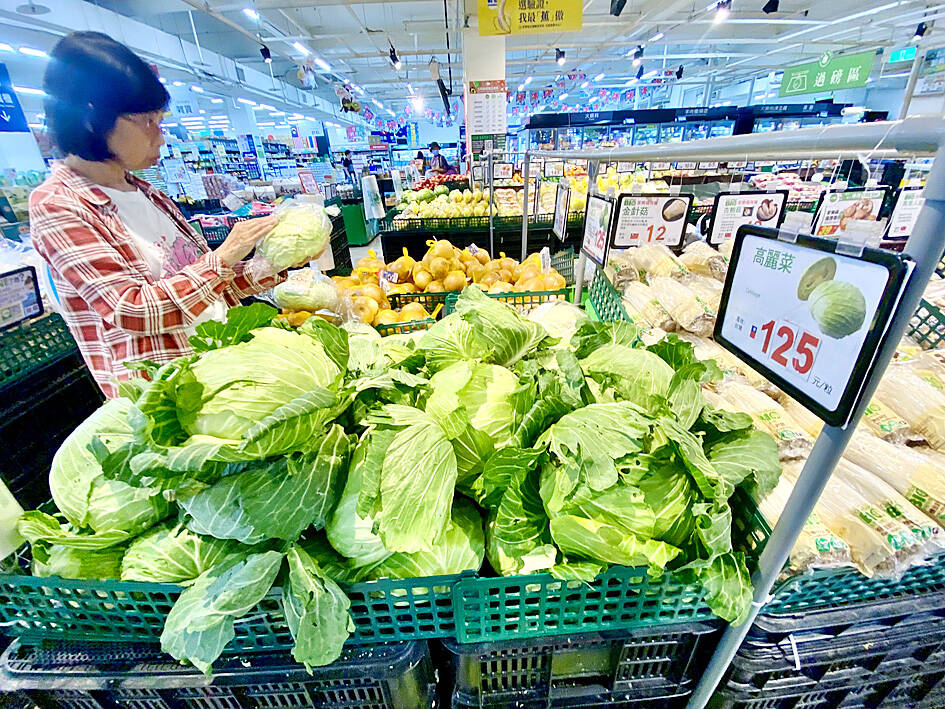The consumer price index (CPI) last month advanced 2.52 percent from a year earlier, as summer vacations boosted entertainment costs, while bad weather pushed up food prices, the Directorate-General of Budget, Accounting and Statistics (DGBAS) said yesterday.
The inflationary measure rose above the central bank’s 2 percent target after two months of easing, raising the shadow of monetary tightening ahead of the body’s policy meeting on Sept. 21.
DGBAS official Tsao Chih-hung (曹志弘) said that the CPI’s resurgence was due to sustained strong demand for entertainment and leisure, while two typhoons disrupted the vegetable market, raising prices.

Photo: CNA
“Stripping away the weather factor, the CPI would have risen just 1.88 percent as it had in July,” Tsao said, calling the inflationary pressures weather-driven and transient.
CPI readings could hover at similar levels this month, as poor weather lingers, but a high comparison base last year would help, he said.
The central bank in June kept interest rates unchanged, but indicated that it would tighten it again if necessary. Most researchers have said that interest rates would stay put for the rest of this year given Taiwan’s moderate inflation and economic slowdown.
The core CPI — a more reliable long-term price tracker because it excludes volatile energy, fruit and vegetable costs — grew 2.56 percent, the slowest in five months and might mitigate as summer vacations come to an end, Tsao said.
The inflationary measure after seasonal adjustments rose 0.18 percent, affirming stable consumer prices, the agency said.
Entertainment and education prices were the main inflation drivers, with a 3.62 percent gain from a year earlier, its latest report found, adding that recreational charges increased 9.11 percent.
Food costs, the largest CPI component, rose 3.46 percent year-on-year after Typhoon Doksuri and Tropical Storm Khanun damaged crops in late July and early last month, Tsao said.
Prices for miscellaneous items rose 2.53 percent, as domestic helpers, jewelry and personal accessories, as well as cosmetic and beauty products grew more expensive, the report showed.
Health and medicine prices increased 2.34 percent, while shelter costs rose 1.77 percent, it said.
Transportation and communication costs rose 1.68 percent, as international oil prices increased 4.32 percent, but local public transportation passes helped lower prices, Tsao said.
The producer price index (PPI), which measures price changes from a seller’s perspective, declined 0.06 percent due to price changes among energy, mineral, metal and chemical products, the DGBAS said.
In the first eight months, the CPI expanded 2.29 percent, while the PPI contracted 0.68 percent, the agency said.

STILL COMMITTED: The US opposes any forced change to the ‘status quo’ in the Strait, but also does not seek conflict, US Secretary of State Marco Rubio said US President Donald Trump’s administration released US$5.3 billion in previously frozen foreign aid, including US$870 million in security exemptions for programs in Taiwan, a list of exemptions reviewed by Reuters showed. Trump ordered a 90-day pause on foreign aid shortly after taking office on Jan. 20, halting funding for everything from programs that fight starvation and deadly diseases to providing shelters for millions of displaced people across the globe. US Secretary of State Marco Rubio, who has said that all foreign assistance must align with Trump’s “America First” priorities, issued waivers late last month on military aid to Israel and Egypt, the

France’s nuclear-powered aircraft carrier and accompanying warships were in the Philippines yesterday after holding combat drills with Philippine forces in the disputed South China Sea in a show of firepower that would likely antagonize China. The Charles de Gaulle on Friday docked at Subic Bay, a former US naval base northwest of Manila, for a break after more than two months of deployment in the Indo-Pacific region. The French carrier engaged with security allies for contingency readiness and to promote regional security, including with Philippine forces, navy ships and fighter jets. They held anti-submarine warfare drills and aerial combat training on Friday in

COMBAT READINESS: The military is reviewing weaponry, personnel resources, and mobilization and recovery forces to adjust defense strategies, the defense minister said The military has released a photograph of Minister of National Defense Wellington Koo (顧立雄) appearing to sit beside a US general during the annual Han Kuang military exercises on Friday last week in a historic first. In the photo, Koo, who was presiding over the drills with high-level officers, appears to be sitting next to US Marine Corps Major General Jay Bargeron, the director of strategic planning and policy of the US Indo-Pacific Command, although only Bargeron’s name tag is visible in the seat as “J5 Maj General.” It is the first time the military has released a photo of an active

CHANGE OF MIND: The Chinese crew at first showed a willingness to cooperate, but later regretted that when the ship arrived at the port and refused to enter Togolese Republic-registered Chinese freighter Hong Tai (宏泰號) and its crew have been detained on suspicion of deliberately damaging a submarine cable connecting Taiwan proper and Penghu County, the Coast Guard Administration said in a statement yesterday. The case would be subject to a “national security-level investigation” by the Tainan District Prosecutors’ Office, it added. The administration said that it had been monitoring the ship since 7:10pm on Saturday when it appeared to be loitering in waters about 6 nautical miles (11km) northwest of Tainan’s Chiang Chun Fishing Port, adding that the ship’s location was about 0.5 nautical miles north of the No.